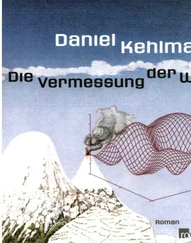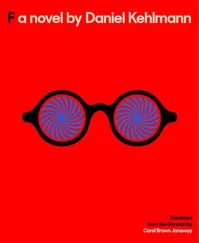I opened my mouth and shut it again.
She put her hands on my shoulders. “Is there something you want to tell me?”
I didn’t move. We were still standing in the corridor. I took a deep breath and didn’t say a thing.
We went inside. Through the hallway, through my untidy living room, and then, as always, into the bedroom.
Seconds later we were lying there and I felt the firmness of her limbs, saw close up the darkness of her eyes. Her hands fumbled with my belt, my hands slid under her blouse, all of their own accord, without hesitation or reflection, it seemed to happen without our intervention. Then the covers and the nakedness and the panting and her strong hands, her clutching me and me clutching her and then we were already apart again, lying exhausted beside each other, out of breath. There was a thin coating of sweat on her skin. The sight made me melt, to such a degree that I was on the point of saying things that I would have needed to take back a few minutes later. Was she really carrying my child? But I already had two, and they were difficult and disconcerting enough, they looked at me suspiciously and asked questions to which I had no answers, and I wasn’t a good father to them.
“It can’t go on like this,” she said.
My stomach went into spasm. “What?”
“This Mollwitz. You’re too nice. You have to do something.”
I slid my hand under her neck. How soft her hair was. The golden fuzz on her arms. The soft curve of her breast. I would have done anything for her and abandoned anything.
Anything?
Anything except the other one who would call me in a few minutes or perhaps next week or next month or sometime this year at the most inconvenient moment, to tell me that she was coming for a surprise visit and was already in town, on my street or already in the building, on the stairs, right in front of my door. If this were a story, I thought, there would be no point in delaying things, and it would happen right now.
The doorbell rang. I sat up with a jerk.
“What is it?” asked Luzia.
“The bell.”
“I didn’t hear anything.”
I stroked her head in silence. I can still confess everything, I thought, I haven’t yet been convicted of anything. Would you forgive me? But I knew she wouldn’t.
Without pulling on my clothes, I went out into the hallway. If I opened the door now and Hannah was standing outside, what should I do? Maybe there was a way to fake my way out of it. In films and stage farces there’s always one, just as everything looks hopeless. The leading actors find the most brilliant subterfuges, open and slam doors, push one woman into one room and the other into another, they maneuver whole groups of people around the smallest spaces without anyone bumping into anyone else. An entire genre specialized in nothing else. Anyone with sufficient determination could surely do the same thing. Almost anything could be accomplished with the necessary strength of mind. Even a double life. But who has it, I asked myself as I stood there naked in the hallway; who has that kind of strength?
I reached for the handle. Even the certainty that there’s absolutely nothing now between you and catastrophe gives a certain assurance. For one last moment I hesitated. Why not have an even bigger scene, an even more powerful effect? If Hannah was standing outside, why not the children too, why not my parents as well, come of their own accord from their dismal retirement home, and while we were at it, why not Lobenmeier, Hauberlan, and Longrolf from Accounting, why not Mollwitz too; all come to see me without my clothes on, without secrets, pretences, illusions, and deceptions, just as I really was.
“Come in.” I opened the door. “Come in, everyone!”
I thought we were going to crash. My God, have you ever been through anything like that?”
Elisabeth shook her head. This time she too had thought this was it: the tiny plane had emitted cracks and groans as it was carried by huge gusts of wind and the packages of medicines had been hurled around in every direction in the cargo bay that stank of metal and gasoline. One of the doctors had been struck in the head, and they’d had to put a pressure bandage on it to stanch the flow of blood. But Leo had sat there calmly the whole time, pale but upright, a narrow, crooked smile on his face.
“I wonder,” he tilted his head back, stretched his arms, and turned around, “why we find this beautiful. Some grass, a few trees, a lot of sky. Why is it like coming home?”
“Not so loud!” She felt dizzy, she had to sit down on the ground for a moment: no asphalt, just reddish earth, flattened hard by the wheels of planes. At the edges of the runway two jeeps were waiting with a number of men in uniform. Two of them were carrying machine guns slung across their bodies.
“A dream from the distant past,” said Leo. “Millions of years on the savannah. Everything subsequent a mere episode. Tell me, are you feeling sick?”
“It’s okay,” she murmured: there was a dull coughing sound and the plane started the propellers: rotating at first, then a gray blur. The machine began to taxi. Müller and Rebenthal, the two doctors, loaded the cartons of medicines onto the jeeps. From time to time one of them cast skeptical glances at Leo. Nobody had been pleased that Elisabeth had come with a companion this time. It wasn’t customary, it wasn’t done; and if anyone were to find out that the nervous guest was in fact a writer whose job it was to spill everything he saw, she would never be forgiven. But Leo had insisted; he wanted, he kept on saying, to learn her world too, and real life couldn’t go on escaping him. So, perhaps because she wanted finally to show him this real life, perhaps because she was curious how he would handle himself under real pressure, but perhaps also because she just couldn’t refuse his wishes, she had finally taken him along.
“Is that a real weapon?” he asked the two doctors. “The one the man over there’s carrying, there, you see, the one in the jeep, is it real?”
“What do you think?” asked Müller. He was a tall, taciturn Swiss who’d worked for years in the Congo and had gone through things there he never talked about. When he’d been hit in the head by the crate during the flight, he hadn’t even groaned.
“Let me help!” Leo snatched the carton out of his hands and set it in the back of the jeep. There was a clink of glass. “Have you read Hemingway? I think about him all the time here. Can you work here without thinking of him?”
“Yes,” said Müller. “Easily.”
“But all this,” Leo pointed to the armed men, then the plane, which was just turning at the end of the runway, “could be straight out of one of his books!”
“Don’t point, please!” said Rebenthal.
“What?”
“Don’t point with your finger.”
“It could make them angry,” said Müller. “That’s certainly not what you want.”
“But these are your people!”
“Leo,” said Elisabeth. “Please.”
“But—”
“Be quiet and go sit in the jeep!”
How could she explain to him? How to make clear to an outsider what compromises had to be made when working in a war zone, how to say to him that you settled for the less murderous faction or the one you thought was less murderous, or you just paid one of them, no matter which, for shelter and protection. She had lived in murderers’ camps more than once, had eaten their bread and their soup, and then treated those people in destroyed villages whom her hosts had left alive. Nothing was clean, no decision was clear, you could only try to help the wounded and ask no questions.
“Look!” cried Leo.
She followed his glance. At the end of the runway the plane left the ground, climbed, grew small, and disappeared into the blazing corona of the sun.
Читать дальше












